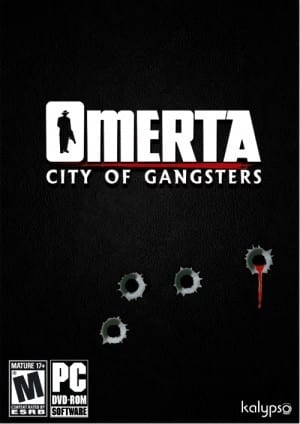
An offer you can refuse
It’s not often enough that games delve into the world of organized crime, but that’s precisely what developer Haemimont did with Omerta – City of Gangsters. Teaming up with old pal Kalypso Media, the developer delivers a fantastically unique experience that merges city simulation, combat, and elements of role-playing for character development. The game goes out of its way to deliver an experience directly customized to the player’s expectations and while it certainly succeeds on some levels, the lack of technical polish and constant issues that arise take the game from a fun, new way to experience city simulation and makes you want to make it sleep with the fishes.
The story is arguably the best part of the game and it’s use of 1920’s gangster cliche isn’t annoying, but rather charming, especially for fans of films like The Untouchables, A Bronx Tale, Goodfellas, or any other of the hundreds of cliche mobster movies. As a newly arrived immigrant, you quickly fall into the world of organized crime. Unlike most who end up dead in the trunk of a car though, you’re smart; you’re savvy. You know that in order to succeed, you can’t go this alone and because of that, you begin recruiting competent men and women who can run jobs and, in dire times, handle a weapon.

As you develop your reputation and begin working for other bosses, you quickly have visions of grandeur. Soon, you’re scheming your way to the top and using your own influence to take control of neighborhoods resulting in additional cashflow. With that money you’re able to import your brother from Italy, the object of your transgressions to begin with. Before long though, your brother lands a job with the Feds and a bitter rivalry heats up between the two of you. As you continue to move up within the Mob, your brother is making your world hard for you. It’s then that you’re faced with a dilemma: do you let him live?
As mentioned, it’s as cliche a story as you’ll see, but something presents endearing moments for both the player and his brother. Other characters won’t provide any sentimental attachment and you’ll soon find that the only loyalties you have are to those who can shoot a pistol or spray a tommy gun. Beyond that, you’ll have no real connection to them, which is a shame because 16 different mobsters are introduced throughout the campaign, each with their own unique personality. The Tucci brothers, Mario and Luigi (yes, I’m serious), give a nod to the lovable plumbers from the world of Nintendo. Mario shouting “It’s a-me, Mario!” each time you order him on a mission, while Luigi is strangely obsessed with doing things better than his older brother is a funny, interesting implementation to the game.

The expectation of a sim/strategy game is that players will be presented with difficulties on both sides of that description. For those looking to simply enjoy the game or if you need a strict difficulty that requires careful precision, the varying difficulty settings do a great job of giving you either. You’ll select a neighborhood to settle in and establish a hideout, which is upgradeable and allows you to establish better buildings within the neighborhood as you do so. All of the available buildings aren’t visible though, and you’ll need to contact informants to discover the locations of important places. Your informants can be easily swayed with booze, or might require you to have a particular fear or likeness rating, established by setting up certain buildings within the neighborhood. Open a soup kitchen for instance, and you’ll be well liked within the community! It doesn’t provide income and in fact does just the opposite, requiring you to pay to keep it operational, but the player must determine the benefit versus the cost in order to succeed.
And that’s precisely the balance that must be mastered to continue on, determining benefit versus cost and risk to advance your own position. As you establish illegal breweries or speakeasies, your day-to-day operations will develop a “heat rating”. Once you have a five-star heat rating, the police will open an investigation into your activities and, upon completion of that investigation, will end your game. You’re a crafty mobster though, and you’ll use your connections to bribe the police or simply frame an enemy to get out of hot water. As you continue to pull jobs, raiding warehouses to steal liquor or beer or ambushing gun runners, all of which are used as a sort of currency within the game, you’ll be met with resistance, resulting in combat scenarios. Using your team of gangsters, you’re moved into a third-person strategy mini-game where players must use the skills equipped to complete a task or, most often, leave the enemy in a bloody pile. Shotguns, tommy guns, pistols, and melee weapons each have their own pros and cons, but battles play out identically from mission to mission and the reuse of many of the same maps leads to a very redundant experience. Soon, players will find that any combat scenario that can be simulated (some you can’t), should be.

Despite the combat’s redundancy, the multiplayer aspect of the game does give something to work towards and presents a surprising level of anticipation as you play. There are two co-op missions and two versus missions, each unique and presenting difficulty and interaction far in excess that which is embodied within the main game. Still, with the limited mission options, the multiplayer grows flat after very few matches.
While it’s a unique spin on the genre entirely, the lack of technical polish is what will reduce your overall experience. The soundtrack seems interesting, focusing on the jazz sounds we love from the 1920’s, but an early glitch will cause the same track to play over and over until your eye starts twitching in annoyance. Hard freezes also plague the game, forcing players to save far more often than necessary or risk losing important spans of gameplay. Finally, some missions suffer from glitches that cause constant no-win scenarios because certain interactions don’t trigger, forcing players to replay the entire mission from the start. In a game where tactics and planning are paramount to victory, these problems are unacceptable and will flat-out ruin your experience.
With its charm and change from the games we’ve typically seen this generation, Omerta – City of Gangsters suffers from a lack of polish and far too many technical problems to be considered even a diamond in the rough. There are certainly some redeeming factors to build upon and if key elements of the game are improved this could be be a surprise hit in the coming years. As it stands today though, it’s an offer you should refuse.
Overall score: 4.5 out of 10
















